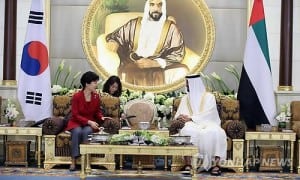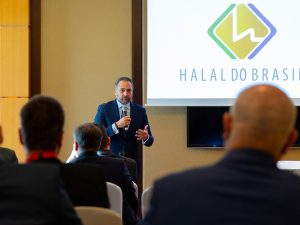
Can the Middle East be a major market for Korean food makers?
President Park Geun-hye appears to be positive of the prospect. She last week signed an agreement with Sheikh Mohammed bin Zayed, Crown Prince of Abu Dhabi, on bilateral cooperation on the production and sales of “halal” food.
Under the agreement, she noted, the two nations will work together to create a creditable halal certificate system, adding it would help expand Korean food companies’ expansion in the region.
A group of food company associations here hailed the decision in a joint statement on Wednesday, expressing high expectation for the region where only a handful of domestic companies sell a limited number of halal-certified products.
The food ministry will soon launch a taskforce, which will work with the Korea Muslim Federation to provide various supporting services. The ministry also plans to build a “halal food complex” inside the food industry cluster, which is under construction in Iksan, North Jeolla Province.
Yet experts seem to be guarding against taking too optimistic an approach. They warned that nothing will be done should the government and companies handle the issue with a short-term strategy. They said this is a project requiring a “long-term investment and cooperation.”
The National Assembly Research Service (NARS) suggested in a report that comprehensive research and studies on the Middle East and its food market be carried out first.
“We have limited information and knowledge about the food business and consumers in the Middle East,” the NARS wrote in the report. “We need to take slow but proven steps, rather than quick and risky one.”
It called on the government to establish a data center collecting and sharing up-to-date information about halal certificate issuers, market trend and related regulations among others.
For food companies seeking expansion to the region, the NARS said it is crucial to study thoroughly about non-business issues such as religion, culture and history, citing the region’s uniqueness.
Halal means lawful or permissible in Arabic and certification is given to only food items that are slaughtered, processed or manufactured in accordance to Islamic law. Muslims are required to consume only halal food. Food makers cannot add pork, alcohol or meat-derived food ingredients such as collagen.
Last year, Korea exported a wide range of halal-certified food products worth $680 million. It plans to increase the amount to $1.23 billion by 2017 as the global halal food market will expand to $1.6 trillion.
ARTICLE TWO
Korean gov’t launches specialized halal food agency on Thursday, following recent halal food MOU with UAE
For example they don’t consume pork of any form, alcohol, and animals that are not properly slaughtered under Islamic law.
Permissible food is labeled ‘halal’ as “halal” means “allowed” in Arabic.
And since the late 2000s, many domestic food manufacturers like Nongshim and Pulmuone, have exported some of its food items, such as instant noodles and snacks,.. that earned halal-certifications.
Korea aims to double the nation’s halal foods exports, from some 680 million U.S. dollars last year to over one.two billion dollars by 2017.



